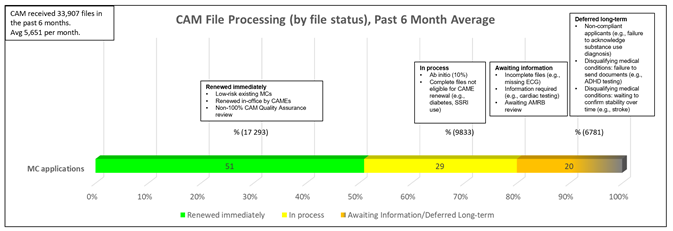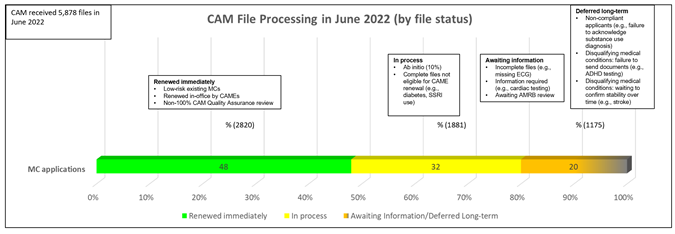Enhancements to the Civil Aviation Medicine (CAM) program to address increasing workload (volume and complexity of files).
Background:
- Pilots, air traffic controllers, and flight engineers must have a valid medical certification to exercise the privileges of their licenses.
- TC receives approximately 60,000 medical evaluation applications annually.
- Since March 2022, applications have increased from approx. 5,000 to 6,000/month: a result of increased aviation interest post-pandemic.
- Three general application categories:
- Non-complex recertification applications: These applications are for individuals previously assessed with no significant license restrictions and no additional health issues since last certification who are seeking renewal of certification. This group represents about 50% of applications received, and they are approved immediately by the examining physician, with no wait time.
- Complete ab initio and complete files not eligible for CAME renewal: These are new applicants not previously assessed, and existing applicants with previously identified health conditions that must be reviewed by Transport Canada before renewal. These are generally assessed within the 40-business day timeline – this group represents about 30% of applications received.
- Complex and incomplete applications: These are new or existing applicants with new or emerging significant health conditions of concern (e.g., heart conditions, stroke, seizures, addictions, etc.), and files which have been submitted incomplete. Additional information is required, and avenues may need to be explored to allow individuals some degree of certification. This group represents about 20% of applications received and may take longer than 40 business days to assess.
- TC is taking a number of measures to address the workload associated with increased volumes and to improve communications with applicants.
Measures being Implemented:
- To address communication issues:
- CAM has two (2) staff members on assignment from other groups dealing with email backlogs.
- Four (4) staff members are answering calls from applicants in our Virtual Call Centre (VCC).
- Thirteen (13) Temporary Help Staff will be online by the end of August, they will support with communications (VCC and answering emails), digitalization, and file processing.
- CAM currently has 2 staff working a total of 40 hours a week on VCC, by early September we should have 4 staff completing a total of 80 hours a week on the VCC.
- Two (2) new term employees will be onboard by mid-September to support with communications and file processing.
- Director and DG briefings to various industry groups to keep industry informed on the progress being made and create an additional channel for specific requests for groups or individuals (ex. Prioritizing cadet MERs in time for training)
- To optimize staff efficiency, improve communications to the public, and decrease VCC wait times, TCCA will look to leverage ongoing support from DSTO to develop a simple online portal for applicants to check the general status of their medical file. No medical information would be provided but the intent is for applicants to determine whether their application has been received by CAM, whether it has been assigned to a medical resource to process, and what approximate stage of the approval process it is in (e.g. “awaiting supplementary input from applicant”, “pending final assessment” or “file complete”, etc.)
- To increase CAM program efficiency
- Implemented a risk-based triage system in medical applications to eliminate the 100% review of applications.
- Established triage channel with stakeholders (e.g., associations, unions, operators, schools) to prioritize commercial files.
- Surge capacity to be dedicated to backlog - eleven part-time contract physicians will be online by mid-September to increase file processing output.
- Increased digitization of processes:
- Implementation of electronic medical examination review system to eliminate paper-based dependencies: close to 90% of applications are now electronic.
- Development of an IT solution for applicants to track their files. The IT solution (application) is set to be online by the end of 2022-23.
- Digitization of existing files to further streamline review process and target backlog: complete by end of 2023-24.
Results:

Text version
Table on Civil Aviation Medicine File Processing (by file status), Past 6 Month Average
CAM received 33,907 medical certificate applications in the past 6 months. Average 5,651 per month.
- 51% or 17,293 were renewed immediately:
- Low-risk existing medical certificates
- Renewed in-office by civil aviation medical examiners
- Non-100% CAM Quality Assurance review
- 29% or 9,833 are in process:
- Ab initio (10%)
- Complete files not eligible for civil aviation medical examiners renewal, for example, diabetes, SSRI use)
- 20% or 6,781 are awaiting information or deferred long-term:
- Awaiting information:
- Incomplete files, for example, missing ECG
- Information required, for example, cardiac testing
- Awaiting AMRB review
- Deferred long-term:
- Non-compliant applicants, for example, failure to acknowledge substance use diagnosis
- Disqualifying medical conditions: failure to send documents, for example, ADHD testing
- Awaiting information:
Disqualifying medical conditions: waiting to confirm stability over time, for example, stroke

Text version
Table on Civil Aviation Medicine File Processing in June 2022 (by file status)
CAM received 5,878 medical certificate applications in June 2022:
- 48% or 2,820 were renewed immediately:
- Low-risk existing medical certificates
- Renewed in-office by civil aviation medical examiners
- Non-100% CAM Quality Assurance review
- 32% or 1,881 are in process:
- Ab initio (10%)
- Complete files not eligible for civil aviation medical examiners renewal, for example, diabetes, SSRI use)
- 20% or 1,175 are awaiting information or deferred long-term:
- Awaiting information:
- Incomplete files, for example, missing ECG
- Information required, for example, cardiac testing
- Awaiting AMRB review
- Deferred long-term:
- Non-compliant applicants, for example, failure to acknowledge substance use diagnosis
- Disqualifying medical conditions: failure to send documents, for example, ADHD testing
- Awaiting information:
Disqualifying medical conditions: waiting to confirm stability over time, for example, stroke